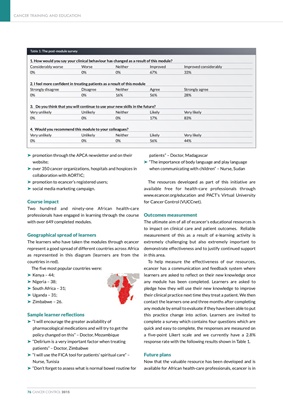
CANCER TRAINING AND EDUCATION
76 CANCER CONTROL 2015
‰ promotion through the APCA newsletter and on their
website;
‰ over 350 cancer organizations, hospitals and hospices in
collaboration with AORTIC;
‰ promotion to ecancer's registered users;
‰ social media marketing campaign.
Course impact
Two hundred and ninety-one African health-care
professionals have engaged in learning through the course
with over 649 completed modules.
Geographical spread of learners
The learners who have taken the modules through ecancer
represent a good spread of different countries across Africa
as represented in this diagram (learners are from the
countries in red).
The five most popular countries were:
‰ Kenya - 44;
‰ Nigeria - 38;
‰ South Africa - 31;
‰ Uganda - 31;
‰ Zimbabwe - 26.
Sample learner reflections
‰ "I will encourage the greater availability of
pharmacological medications and will try to get the
policy changed on this" - Doctor, Mozambique
‰ "Delirium is a very important factor when treating
patients" - Doctor, Zimbabwe
‰ "I will use the FICA tool for patients' spiritual care" -
Nurse, Tunisia
‰ "Don't forget to assess what is normal bowel routine for
patients" - Doctor, Madagascar
‰ "The importance of body language and play language
when communicating with children" - Nurse, Sudan
The resources developed as part of this initiative are
available free for health-care professionals through
www.ecancer.org/education and PACT's Virtual University
for Cancer Control (VUCCnet).
Outcomes measurement
The ultimate aim of all of ecancer's educational resources is
to impact on clinical care and patient outcomes. Reliable
measurement of this as a result of e-learning activity is
extremely challenging but also extremely important to
demonstrate effectiveness and to justify continued support
in this area.
To help measure the effectiveness of our resources,
ecancer has a communication and feedback system where
learners are asked to reflect on their new knowledge once
any module has been completed. Learners are asked to
pledge how they will use their new knowledge to improve
their clinical practice next time they treat a patient. We then
contact the learners one and three months after completing
any module by email to evaluate if they have been able to put
this practice change into action. Learners are invited to
complete a survey which contains four questions which are
quick and easy to complete, the responses are measured on
a five-point Likert scale and we currently have a 2.8%
response rate with the following results shown in Table 1.
Future plans
Now that the valuable resource has been developed and is
available for African health-care professionals, ecancer is in
Table 1: The post-module survey
1. How would you say your clinical behaviour has changed as a result of this module?
Considerably worse Worse Neither Improved Improved considerably
0% 0% 0% 67% 33%
2. I feel more confident in treating patients as a result of this module
Strongly disagree Disagree Neither Agree Strongly agree
0% 0% 16% 56% 28%
3. Do you think that you will continue to use your new skills in the future?
Very unlikely Unlikely Neither Likely Very likely
0% 0% 0% 17% 83%
4. Would you recommend this module to your colleagues?
Very unlikely Unlikely Neither Likely Very likely
0% 0% 0% 56% 44%